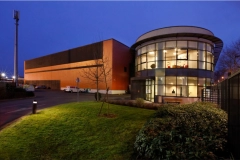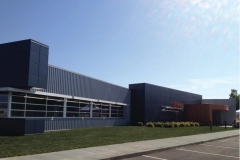CyrusOne’s Next Chapter: Building Strategic Scale for Cloud Runways
CyrusOne’s Next Chapter: Building Strategic Scale for Cloud Runways
Last July, Dave Ferdman stepped into an uncertain situation as he agreed to once again lead CyrusOne, the data center company he founded in 2000. He had departed in 2013, but after the sudden departure of CEO Bruce Duncan, Ferdman agreed to return as interim CEO and work with the board to “evaluate potential successors.”
Nine months later, Ferdman is the President and CEO of a newly energized CyrusOne, which is now backed by two of the world’s largest investors following a $15 billion buyout. New owners KKR and Global Infrastructure Partners (GIP) have tapped Ferdman to guide the company into its next chapter of growth.
“The ‘interim’ is off my title,” said Ferdman. “I’m going to work with our new partners to continue to build this platform, and that’s an exciting opportunity.”
The acquisition closed March 25, with CyrusOne becoming a private company after 9 years trading on the NASDAQ stock exchange. It enters the transition with momentum after leasing a whopping 101 megawatts of data center capacity in the fourth quarter of 2021.
The financial strength and experience of KKR and GIP positions CyrusOne to prosper from the dynamic growth of cloud computing, which is accelerating as the global economy shifts to digital delivery of goods and services.
CyrusOne has been a leader in the rapid growth of the data center industry, advancing techniques for building at speed and scale while supporting the growth of many of the Internet’s largest companies.
Ferdman says CyrusOne remains focused on scale, but will be strategic in how and where it pursues it.
“The market is definitely growing, but we want to be really careful and prescribed as to how we grow,” Ferdman told Data Center Frontier. “We don’t want growth for the sake of growth, and putting dots on a map. We will spend our time making sure we’re choosing the right places and the right customers and the right topology.”
A key priority is adding capacity in high-growth markets to provide long-term growth for its cloud and enterprise clients.
“Our customers are not just seeking more density and more scale,” said Ferdman. “They really want runway. Our customers are putting in large network cores, and those are creating data gravity. They want to know that they can maximize the utilization of their network. When we see a project coming, we’ll size up how we can work with them to grow and scale the network deployment.”
The Story So Far … History and Deal Background
CyrusOne operates more than 50 data centers and 4 million square feet of data center space across the globe, working with both hyperscale operators and enterprise customers. The company’s focus on accelerated deployment has helped it reach the very top levels of the data center business.
CyrusOne was founded by Ferdman in 2000, and found its niche specializing in high-density colocation services for energy companies in Houston and Dallas. The company, which was named for a Persian ruler featured in the Old Testament, expanded across Texas after it was acquired in 2007 by private equity firm ABRY Partners. In 2010, Cincinnati Bell paid $525 million to buy CyrusOne, which was then spun off in an IPO in January 2013.

Dave Ferdman, the President and CEO of CyrusOne. (Photo: CyrusOne)
Strong leasing to hyperscale operators boosted shares of CyrusOne. Investors who bought shares of CONE at the IPO and held through last month’s sale saw gains of 310% over nine years.
But the journey had its bumpy moments. During the early months of the COVID-19 pandemic, CyrusOne struggled to land hyperscale deals during a period of record leasing for wholesale data center space. In the third quarter of 2020, the company leased just 4 megawatts (MWs) of capacity.
The 101 MWs of leasing last quarter indicates CyrusOne has regained its sales mojo since Ferdman’s return. The ongoing value of the company’s global platform is reflected in the $15 billion sale price, a record for the data center sector.
Taking the Long View
The new owners of CyrusOne are huge financial players whose resources and expertise enable the company to compete at scale on a global basis. KKR has a 40-year history of high-profile deals, including leveraged buyouts, while Global Infrastructure Partners is one of the world’s largest infrastructure funds, managing more than $79 billion in assets.
“We’ve got a fantastic relationship with our new partners,” said Ferdman. “They’re really engaged and enthusiastic, and it’s nice to bring some fresh eyes to help us solve some of these challenges as we grow. Now that we’re private, we’re focused on accelerating our growth.”
GIP Partner Will Brilliant says the new owners will be “bringing our experience and deep resources … to unlock significant additional potential” for CyrusOne.
What might that look like? As we noted last week, the influx of capital and M&A action has gradually shifted the competitive landscape in the data center industry, with more private operators and fewer public companies. As more large investors build data center platforms, the cost of capital is an increasingly important competitive differentiator, allowing companies that have low borrowing costs to build new capacity at a lower cost.
Ferdman said private companies can also think differently about investment,
“As a public company, it’s sometimes challenging to invest capital for the longer term.” said Ferdman. “We’re focused on buying a little further out in the future (for the supply chain, for example). I think we’re able to take a deep breath and not focus on quarter-to-quarter, and that really helps the strategic vision, especially when you’re dealing with larger projects that mean a longer build, and the supply chain is obviously causing some delays.
“We’re still going to be held accountable,” he said. “But at the end of the day, I think it helps to be able to navigate longer term infrastructure and bigger projects.”
Future Opportunities and Challenges
CyrusOne is closely tracking how workloads are evolving within its core set of customers.
“For many years, we saw public cloud being the primary product within the hyperscale community.” said Ferdman. “We’re now seeing lots of different, very scalable projects that aren’t just their resellable product itself, like the cloud. There are all kinds of artificial intelligence applications that are being deployed, including by some of the enterprise providers. We’re seeing the public hyperscale clouds deploy both public clouds and back-office type support applications.
“We’ve always seen each of the different applications or product types deployed, but we’re now seeing just a surge of all of that,” he said.
Sustainability will be a key focus. It’s an area where CyrusOne’s messaging has trailed many of its competitors, but the company is redoubling its efforts.
“Sustainability has become a very important strategic principle for the company,” said Ferdman. “Our new partners are highly interested in renewable energy. Were focused on being good stewards.”

A new CyrusOne data center in Sterling, Virginia. (Photo: Rich Miller)
CyrusOne is placing a special emphasis on water scarcity and reducing the impact of its data centers on local water supplies, especially at the company’s large campuses in Phoenix and Dallas, which it says are “water positive.” The company’s latest data center design uses an air-cooled chiller with an integrated compressor and condenser to cool a closed loop of water. This chilled water is used to remove the heat from the data hall, but none is evaporated in the process. The water loop is filled once during construction and remains filled throughout the life of the facility.
This week CyrusOne said it has begun working with the Carbon Disclosure Project to provide more detailed accounting of its impact on climate change and water security.
“Raising the bar for CyrusOne and reporting our progress to CDP is an important next step to take in advancing our commitment to sustainability,” said Kyle Myers, senior director of Environmental Health, Safety & Sustainability at CyrusOne.
Another strategic consideration is the ongoing consolidation and M&A in the digital infrastructure sector. With deeper financial resources, will CyrusOne buy or build?
“We’ve had a few acquisitions, but we’re a really good developer of data centers, and so we’re going to continue down that path,” said Ferdman. “But we do have two new partners that are really good at doing inorganic things, and we are going to take advantage of those resources when it makes sense. We’re not chasing growth for the sake of growth. If something is a perfect fit, it’s nice to know that we have the resources to do what’s best long-term.”
The bulk of CyrusOne’s footprint is in the U.S. and Europe. It has forged international partnerships with Odata in South America and GDS in China, as well as an acquisition of Zenium to accelerate its entry into Europe. The company currently has one data center in Asia, in Singapore, and has laid out plans to eventually build more facilities in the region.
“We’d love to get to Asia faster,” said Ferdman. “That is a strategic opportunity for us.”
More >> CyrusOne’s Next Chapter: Building Strategic Scale for Cloud Runways


